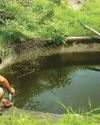Prøve GULL - Gratis
CAN AGROFORESTRY CREDITS BE SAVED?
Down To Earth
|March 01, 2025
Ensure that farmers benefit from the carbon revenue and stay protected against market failure
-

THE INDIAN government is keen on using agroforestry to meet its climate goals, introduce regulation in voluntary carbon market (VCM) projects in the agriculture sector, including agroforestry, and incentivise farmers to switch to sustainable farming practices, Suresh Kumar Chaudhari, deputy director general (natural resource management) at the Indian Council of Agricultural Research (ICAR), tells DTE. "We would like to explore how VCM can be used to meet our Nationally Determined Contributions (NDCS) and sell the rest in the international market," Chaudhari adds.
As per India's NDC, submitted to the UN Framework Convention on Climate Change (UNFCCC), the government aims to create additional carbon sinks of 2.5 to 3 billion tonnes of CO₂e through increased forest and tree cover by 2030. The 2023 India State of Forest Report (ISFR) shows that India's carbon stock in forests and tree cover has reached 30.43 billion tonnes of CO₂e. Compared to the base year of 2005, when the carbon stock was 28.14 billion tonnes CO₂e, the country has created 2.29 billion tonnes of additional carbon sink and "is on track to meet its 2030 target", states the report. The tree green cover under agroforestry, whose share has increased by over 20 per cent between 2013 and 2023, appears to have played a significant role in reaching this goal. Agroforestry is also one of the potential areas for carbon credits in the framework for the domestic VCM in the agriculture sector, introduced by the Union agriculture ministry in January 2024.
Denne historien er fra March 01, 2025-utgaven av Down To Earth.
Abonner på Magzter GOLD for å få tilgang til tusenvis av kuraterte premiumhistorier og over 9000 magasiner og aviser.
Allerede abonnent? Logg på
FLERE HISTORIER FRA Down To Earth

Down To Earth
COP OF TALK
The UN's 30th climate summit, COP30 in Belém, was billed as the COP of truth and implementation.It was an opportunity for the world to move beyond diagnosis to delivery. Instead it revealed a system struggling to prove its relevance.
14 mins
December 01, 2025
Down To Earth
1,500 days, and an alarm for new climate
SEASONS ARE the compass that guide humans to survive and thrive as a society. What happens if seasons lose their distinct character and predictable rhythm? This is no longer a theoretical question. The Earth is entering a new climate regime, its atmosphere now saturated with greenhouse gases at levels without precedent in human history. And the earliest sign of this shift is the near-dissolution of familiar seasons; all merging and dissipating like the pupa inside the chrysalis, but, not to give birth to that mesmerising butterfly. This metamorphosis is manifest in the blizzard of weather events, extreme in severity and unseasonal by nature and geography.
2 mins
December 01, 2025

Down To Earth
Rights in transit
A recent dispute over transport and trade of kendu leaves in Odisha highlights differing interpretations of forest rights laws in the state
6 mins
December 01, 2025
Down To Earth
Roots of peace
Kerala's forest department plants fruit and fodder trees to ease human-wildlife tensions
2 mins
December 01, 2025

Down To Earth
Flattened frontiers
Efforts to reclaim degraded land from Chambal ravines expose both people and biodiversity to ecological risks from erosion and flooding
5 mins
December 01, 2025

Down To Earth
INDIA'S DRY RUN
India is poised to be a global hub of data centres—back-end facilities that house servers and hardware needed to run online activities.
21 mins
December 01, 2025

Down To Earth
Bangla generic drugs to the rescue
A buyer's club for generic cystic fibrosis drugs sourced from Bangladesh highlights the country's laudable pharma development
4 mins
December 01, 2025

Down To Earth
Direct approach
A new direct cash transfer scheme as well as decades of women-centric programmes yield an electoral windfall for the ruling alliance in Bihar
5 mins
December 01, 2025

Down To Earth
HIDDEN RESOURCE
Punjab's 1.4 million abandoned borewells offer a chance to mitigate flood damage and replenish depleting groundwater
4 mins
December 01, 2025
Down To Earth
Corporate bias
INDIA'S DRAFT Seeds Bill, 2025, introduced by the Centre in mid-November, proposes a few key changes.
1 min
December 01, 2025
Listen
Translate
Change font size
